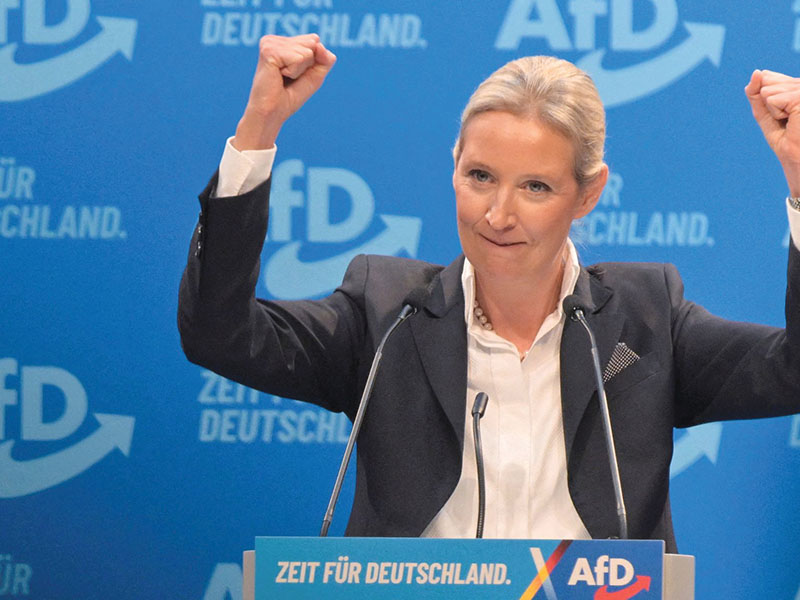Germany: AfD shadow

AfD supremo Alice Weidel: firing pledge
For many decades, Germany has been famous for its political stability, having had just nine chancellors in the post-war era. But the country’s memories of its Nazi past have not rendered it immune to the global rise of right-wing populism, with politicians exploiting economic malaise and terrorist incidents to pin the blame on immigration.
And while the centre-right alliance of the Christian Democratic Union (CDU) and Bavaria’s Christian Social Union (CSU) has again triumphed in the latest election, the far-right populist party, Alternative for Germany (AfD), has emerged as the second-largest party in the Bundestag, with 20 percent of the vote.
CDU leader and probable German Chancellor Friedrich Merz has repeatedly ruled out forming a governing coalition with the AfD. Nevertheless, there is a widespread sense that its influence on German politics is growing. And many academics fear what that might mean for German higher education that depends on international talent. Andreas Keller, vice president of the German Trade Union for Education and Research (GEW), fears that the AfD’s rise poses a “great danger” to German higher education and research. “International academics are already avoiding university locations in eastern Germany, where the AfD is particularly strong,” he says.
Germany welcomed record numbers of international students this academic year, with the total exceeding 400,000. Rising support for the AfD, however, could threaten this trajectory. “Political shifts influence perception,” says Carolina Figueiredo, general coordinator of the international student association DEGIS. “If students feel uncertain about their rights, safety or future opportunities, they may start considering other destinations.”
According to her, DEGIS has heard concerns from international students, “particularly those from racialised or ‘visibly foreign’ backgrounds, about experiences of discrimination or xenophobia in daily life. When discussions around migration become more restrictive or polarising, it can create uncertainty for international students about their place in German society.”
Student visa issuance is one area in which the federal government has direct control over universities. Most education policies are determined at the level of its 16 states, known in German as Lander, but the federal government also has other important powers, Keller believes. “It can participate in funding; it can attach conditions to funding; it has legislative competence for education funding and for employment law.”
The AfD certainly has a motive to exercise those powers, should it ever acquire them. Its manifesto rails against “the increasing influence of ‘woke’ ideology on universities,” and its leader Alice Weidel has pledged to close gender studies faculties and to fire professors despite the enshrining of freedom of research as a constitutional right.
The Greens, SPD, CDU/CSU and FDP have all emphasised the importance of basic research in their election campaigns, while the Left has called for “basic funding for universities” to reduce “dependence on third-party funding”. Both the Greens and the CDU/CSU have promised to invest 3.5 percent (or “significantly more”, in the Greens’ case) of Germany’s gross domestic product in research and development, a pledge Ziegele describes as “important”.
But if the AfD acquires any power or influence, it will seek to make good on its rhetoric attacking “ideologised climate research, gender research and pandemic research”. And Emmi Kraft, who sits on the board of directors at Germany’s main national student body, FZS says many academics are “very afraid and concerned” by the prospect.
















Add comment